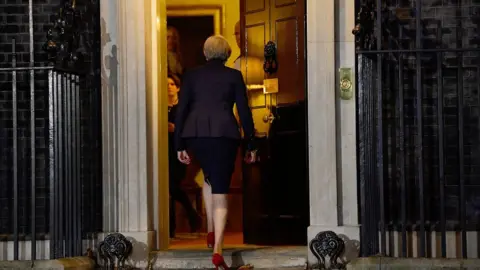Brexit agreement: What happened and what's next?
 Reuters
ReutersRegular readers know that I am sometimes, especially at an uncertain moment, fond of making a list.
On Wednesday night, the prime minister has taken a big step forward on the path to taking the UK out of the EU without a giant political accident.
It's not been a pretty process so far, and five hours of cabinet discussion was not easy either. But again, she made it this far. Surviving tonight, though, does not mean surviving Thursday. So what happened and what's next?
- The most important fact on Wednesday night - Theresa May has a draft divorce deal with the EU that sorts out how and when we leave, and gives the outline of what the relationship will be like for decades to come. Given how difficult it's been to get this far and how uncertain it's been that she would make it to this point, that is a big achievement.
- The cabinet backed her, but not exactly with glad hearts. Depending who you ask, either about 10 of its members objected properly to the deal, or about 10 of them expressed a few doubts but didn't have any alternatives to give. The truth is probably somewhere in between. A source in the room told me the sense was that most of them knew this was the only real choice, but none of them wanted it to be done in their name. Having talked to a few people who were present the sense was a reluctant inevitability. And backing from Michael Gove and Geoffrey Cox was key to making that that happen.
- The cabinet is still pretty divided on the substance of the deal. Although they are now bound by collective responsibility, that means in these trying days ahead, Theresa May can't rely on having colleagues on tap ready to fight for her deal on air, in the Commons tearooms and even in the division lobbies on the crucial night when the vote takes place.
- The threat of resignations is still live. Esther McVey, the work and pensions secretary, seems the most likely to go, followed by the International Development Secretary, Penny Mordaunt. And there is silence tonight and a lot of chatter about the position of the Brexit Secretary, Dominic Raab (update: Raab resigned on Thursday morning). One might not be a problem for the PM. The departure of either Mordaunt or Raab or both, both of whom harbour ambitions for the top job, would be very dangerous for Number 10.
- Just as immediately - Brexiteer backbenchers are furious, just like the DUP. And it is possible that the Parliamentary postman will be extremely busy tomorrow with letters that might trigger a challenge to Mrs May. One senior Tory told me on Wednesday night there was likely to be a move against the prime minister in the next 24 hours. Another said they would be amazed if enough objections to start a contest hadn't emerged by lunchtime on Thursday. NB - we have been here before. But soundings so far suggest the reaction among Eurosceptic MPs is more negative than they had expected. This could - I stress, could - be the moment the Tory party falls into a leadership contest almost by mistake.
- Lastly - if Theresa May gets through the next couple of days and then a summit with the EU on 25 November, she gave us a preview of her script: Her deal, no deal, or no Brexit. For those campaigning for another referendum, the first mention of the fact the whole thing could fall is an admission they are bound to make hay with. But for her colleagues it's a warning, the script that she hopes will see her through.
- You can hear more on the deal from Laura, BBC Europe editor Katya Adler and BBC Europe correspondent Adam Fleming in an emergency edition of the BBC's Brexitcast Podcast.